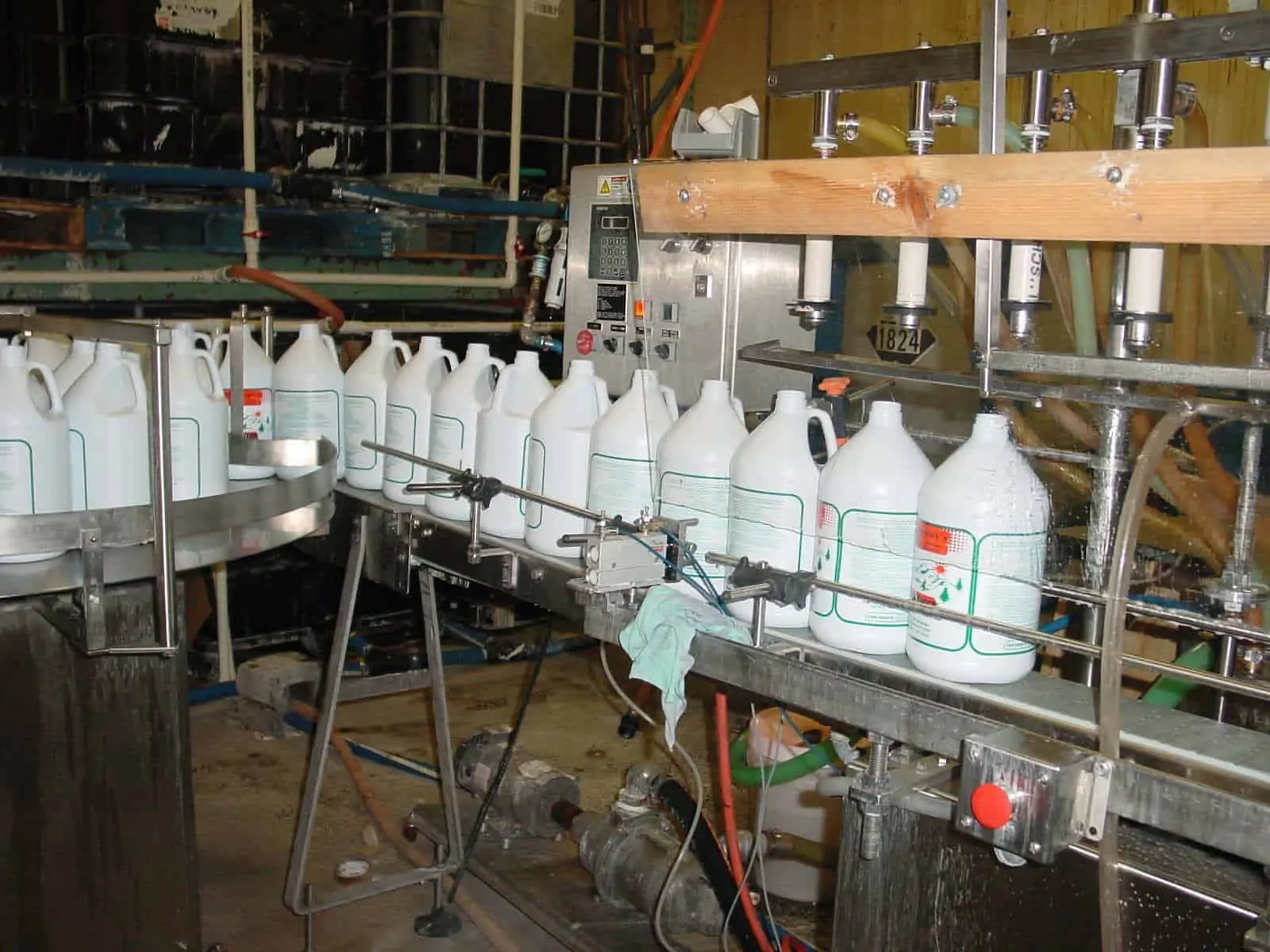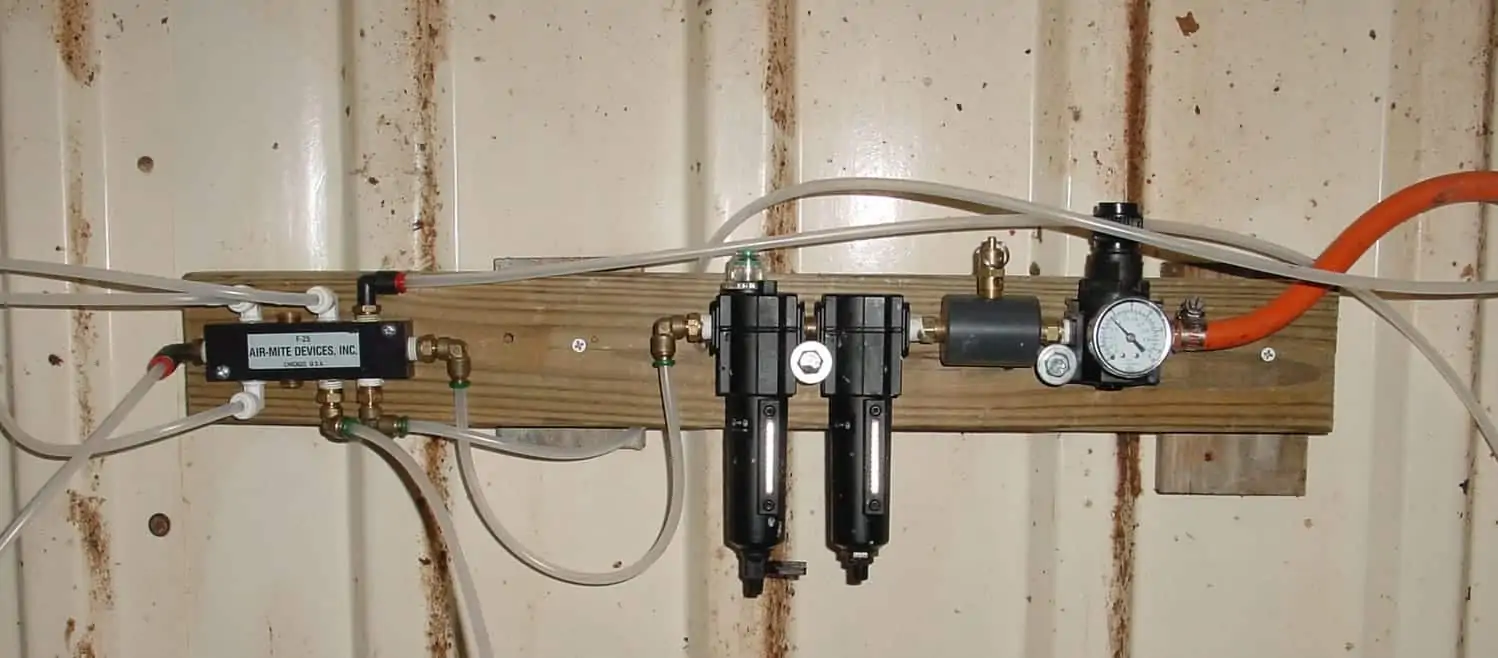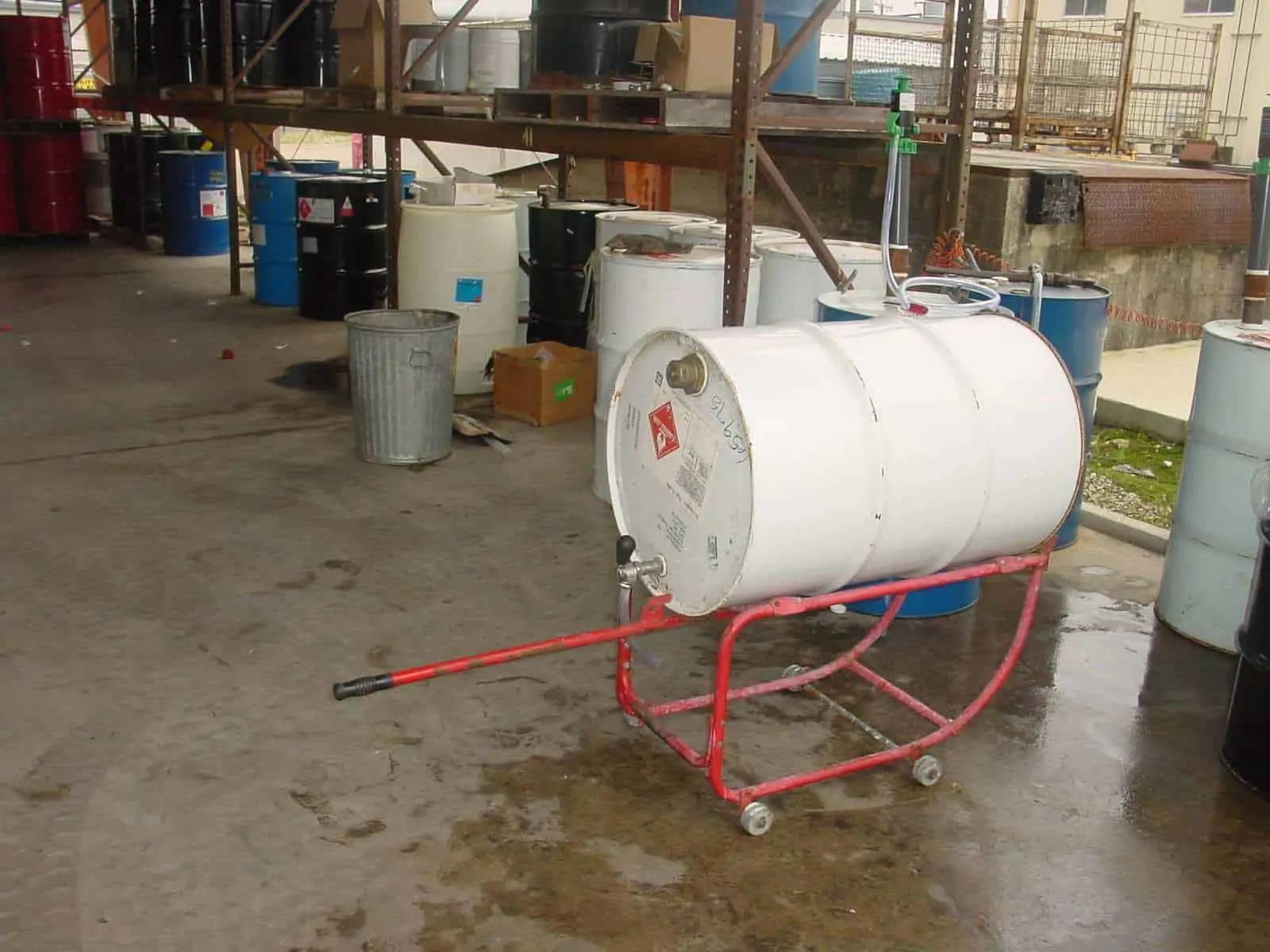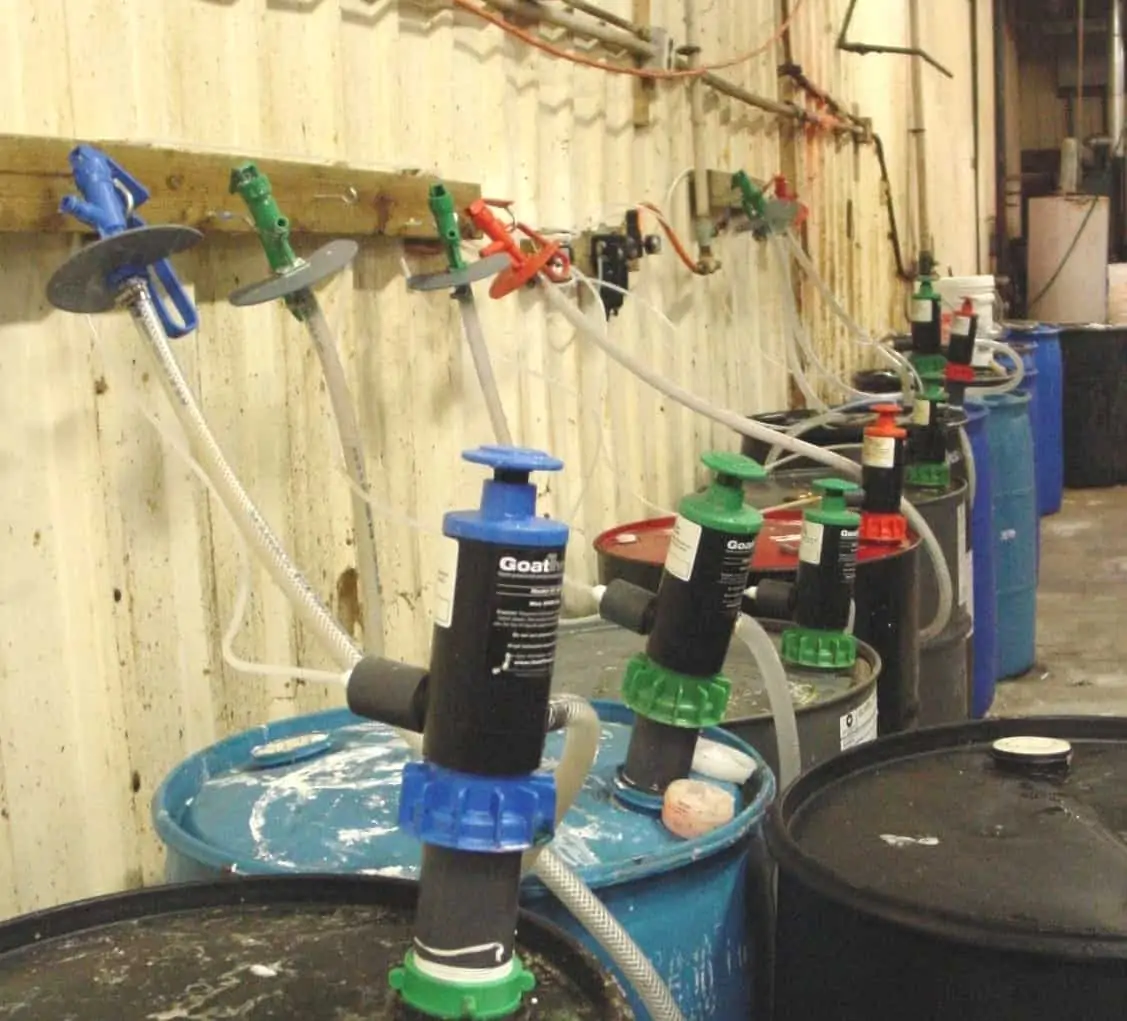SUSTAINABLE SOLUTIONS FOR CHEMICAL HANDLING AND WORKER SAFETY
Ridgway Industries of Pennsylvania is a manufacturer of industrial and household cleaners. Their product line consists of household and industrial cleaning products, from dishwashing detergents to floor strippers and power-washing solutions. All of them are chemical based.
Ridgway’s manufacturing process involved workers tipping and taping heavy 55-gallon drums of chemicals and dispensing from leaky spigots into open transfer containers with additional handling required to transfer the fluids to point of use. The gravity fed process involved threading the brass fixture into the small bung in the top of the drum, threading a vent into the large bung, placing the drum on a roll down drum fixture and tipping the drum into the horizontal position for dispensing.
There are many inherent difficulties with the gravity-fed spigot system. First, the spigots can clog up easily and can be difficult to remove. It can be very labor intensive and awkward to remove the fluid from the drum. Secondly, it is difficult to control the flow rate from the drum. Further, leaks are common with the spigot system, which contributes to fugitive inventory loss. Finally, this system does not allow for complete removal of all fluid from the drum, so additional labor and handling is required to make the drum R.C.R.A. empty (Resource Conservation and Recovery Act)..
According to Ridgway ower Brad Dagy, “A chemical disaster was always just one slip-of-hand away”. The consequences, Dagy knew, threatened employees and the environment as much it did his bottom line in terms of employee safety and inventory waste.
A few close calls prompted Dagy to seek out a new chemical handling solution. Taking cues from the EPA’s information on Process Hazard Analysis, Dagy found a systematic way for he and his
safety manager to identify and analyze the significance of potential hazards associated with the processing or handling of highly hazardous chemicals. The two men reviewed the shop’s equipment and the manufacturing processes and found that both needed improvement. The crux of both solutions was found in a chemically compatible and environmentally compliant transfer pump system. The system utilized a single shop air-line set at 4psi to run multiple pumps. With the new system in place, Ridgeway’s new detergent manufacturing process can transfer fluid chemicals directly to their point of use and allow them to be dispensed accurately from a spring-activated nozzle.
The system is simple and efficient in providing the ability to safely dispense multiple chemicals directly from th
eir individual upright drums at a rate of 4gpm. Adding the use of the pumps also changed the manufacturing process by saving time and eliminating dangerous tipping, splashing, spilling or transporting open containers of chemicals. An unanticipated benefit is in the pump’s ability to empty the drums of chemicals to the RCRA (Resource Conservation and Recovery Act) compliant standard. And when properly maintained, the pumps last 10 years, which minimizes waste disposal.
In its efforts to improve safety and chemical handling processes, Ridgway has made significant strides in sustainability through improved worker safety, safer chemical handling, improved pollution prevention and VOC reduction, while providing substantial reviewed the shop’s equipment and the manufacturing processes and found that both needed improvement.
Finding a Solution
Dagy came to Westcott with a list of eight fluids, three of which were blended chemicals that were not included in GoatThroat’s compatibility guide. To complicate matters, while all fluids were being dispensed from 55-gallon drums, some of the drums were made of steel and others were made of plastic with buttress-type fittings. Westcott worked with Ridgway’s chemical suppliers, including Dow Chemical which supplied the company with Tergitol and Versene 100, in order to verify the chemical compatibility between each fluid and its respective pump. Proper compatibility would also contribute to maximum pump-life expectancy. Taking all variables into consideration, Westcott provided Ridgway with a complete pumping solution for every fluid and container situation.
“We understand the challenges that dispensing and mixing chemicals presented to worker safety and environmental compliance, and we spend a lot of time in our pump lab working on how we
can help our customers address them,” said Westcott. GoatThroat’s simple and efficient pumps work by adding very low amounts of pressure to the vessel, less than 6 psi, to push the fluid out of the drum. A spring-activated control on the tap allows precise control of the amount of fluid being dispensed. The GT Multi-Pump System can safely dispense multiple chemicals directly from their individual upright drums at a rate of 4 gpm depending on viscosity. All GoatThroat pumps can be outfitted with a choice of four different elastomers — Nitrile, EPDM, Santoprene, and Viton, making them compatible with more than 1700 fluids and chemicals including the most commonly used acids, caustics, solvents, and alcohols. When properly outfitted and matched to the fluid, a properly maintained pump will last for 10 years.
With the new system in place, Ridgway’s new detergent manufacturing process can transfer fluid chemicals from multiple pumps, utilizing a single shop air-line set at 4 psi. Dagy added a remote tap extension accessory, with five feet of hose, and now his fluids
are delivered directly to their point of use and accurately dispensed from a spring-activated nozzle. Adding the use of the pumps also changed the manufacturing process
by saving time and eliminating the dangerous tipping, splashing, spilling, and transporting of open containers of chemicals. An unanticipated benefit is in the pump’s ability to empty the drums of chemicals to meet the Resource Conservation and Recovery Act compliant standard, saving additional money when returning the drums to the manufacturer.
In its efforts to improve safety and chemical handling processes, Ridgway has also made significant strides in sustainability through improved worker safety, safer chemical handling, improved pollution prevention, and VOC reduction while providing substantial contributions to the company’s bottom line. The company has been safely and more efficiently pumping chemicals without incident since 2006.
For manufacturers, a sustainable business strategy can actually improve the operation at all levels of the company. It has even been suggested that parallels can be drawn between good environmental management practices and good overall management at both the strategic and operational levels. Best of all, companies are learning that cost advantages can result from adopting best practices when the focus is on production processes. Serving as the precondition for all environmental best practices, process focused best practices are one of the most basic building blocks in a complete environmentally responsible strategy. And, process-focused best practices can create cost savings faster than other practices. Companies can choose from a variety of technologies to reduce negative effects of their activities on the natural environment as well as the business environment. Improved pollution prevention, attention to worker safety, reduction of VOCs, safe chemical handling, and using products with no built-in obsolescence are ways to demonstrate a commitment to environmental responsibility while achieving financial goals. In other words, “going green” improves the bottom line.
- Additional information is available by contacting GoatThroat Pumps at 646-486-3636, visiting www.goatthroat.com, or sending an e-mail to infot@goatthroat.com



